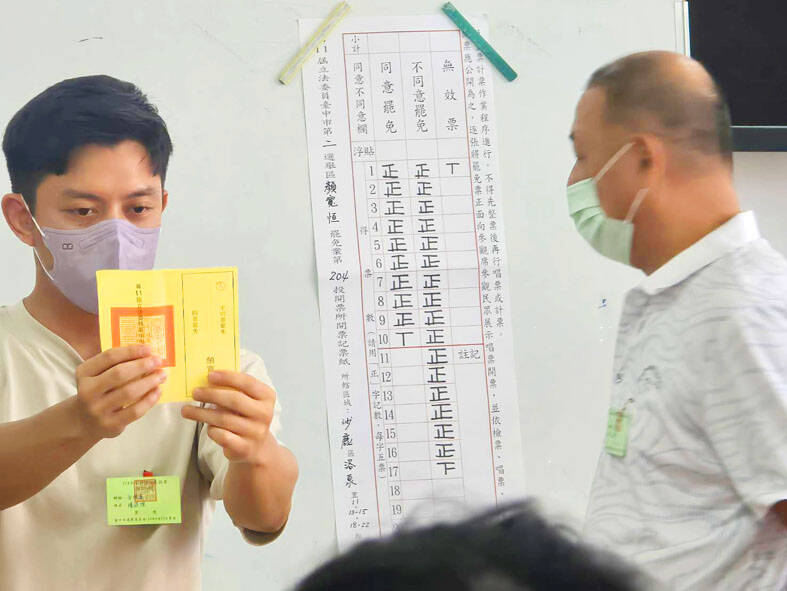Recall campaigns targeting seven Chinese Nationalist Party (KMT) lawmakers all failed yesterday, with “no” votes surpassing the “yes” votes and none of the supporting votes exceeding the one-quarter threshold.
Following the recall voting on July 26 targeting 24 KMT legislators, which also failed, the voting yesterday aimed to oust seven other KMT legislators: Lo Ming-tsai (羅明才) from New Taipei City, Lin Szu-ming (林思銘) of Hsinchu County; Yen Kuan-heng (顏寬恒), Johnny Chiang (江啟臣) and Yang Chiung-ying (楊瓊瓔) of Taichung; and Ma Wen-chun (馬文君) and Yu Hao (游顥) of Nantou County.
The voting was held between 8am and 4pm yesterday, and ballots were counted publicly at the voting stations immediately after.

Starting from 4pm, the “no” votes continuously exceeded the “yes” votes, and at about 5:20pm to 6pm, targeted legislators and recall activist groups declared that the recall campaigns had failed.
According to the Civil Servants’ Election and Recall Act (公職人員選舉罷免法), a recall campaign passes if the number of “yes” votes exceeds the number of opposing votes, and if the supporting votes surpass one-quarter of the total number of eligible voters in the legislator’s electoral district.
None of the total “yes” votes exceeded the one-quarter threshold, and the “no” votes accounted for between 64.48 percent and 69.28 percent of the votes, Central Election Commission data showed.

Photo: Chang Hsuan-tse, Taipei Times
The “yes” and “no” votes for recalling the legislators resulted in 49,990 (34.08 percent) and 96,691 (65.92 percent) for Lo; 33,813 (30.72 percent) and 76,239 (69.28 percent) for Lin; 54,396 (35.51 percent) and 98,809 (64.49 percent) for Yen; 33,977 (32.74 percent) and 69,796 (67.26 percent) for Chiang; 43,677 (34.34 percent) and 83,511 (65.66 percent) for Yang; 29,914 (33.33 percent) and 59,828 (66.67 percent) for Ma; and 33,853 (35.52 percent) and 61,443 (64.48 percent) for Yu.
The voter turnout ranged between 49.24 percent and 50.34 percent.
All 31 KMT legislators that faced recall voting this year have secured their seats.
Liao Chih-yen (廖芝晏), who initiated the recall against Chiang, said that although their goal was not achieved, it does not mean their belief was wrong.
They believed in protecting Taiwan’s democracy and freedom, so they stood up and exercised their constitutional right to recall, which drew the public’s attention, Liao said, adding that their efforts would not go to waste.
KMT Chairman Eric Chu (朱立倫) said that the results represented “the people sounding their loudest alarm bell to the ruling party’s arrogance,” and that Taiwan could no longer continue idling or tearing itself apart.
He also called for reforms in five areas: saving the economy and people’s livelihood and ending under-the-table negotiations, reconstructing the nation’s energy resilience, restoring judicial independence, “returning” to the separation of powers and ending what he called the “constitutional crisis that is heading towards dictatorship,” and mending social divisions and confrontation.
Additional reporting by Shih Hsiao-kung and CNA

MISINFORMATION: The generated content tends to adopt China’s official stance, such as ‘Taiwan is currently governed by the Chinese central government,’ the NSB said Five China-developed artificial intelligence (AI) language models exhibit cybersecurity risks and content biases, an inspection conducted by the National Security Bureau (NSB) showed. The five AI tools are: DeepSeek, Doubao (豆包), Yiyan (文心一言), Tongyi (通義千問) and Yuanbao (騰訊元寶), the bureau said, advising people to remain vigilant to protect personal data privacy and corporate business secrets. The NSB said it, in accordance with the National Intelligence Services Act (國家情報工作法), has reviewed international cybersecurity reports and intelligence, and coordinated with the Ministry of Justice Investigation Bureau and the National Police Agency’s Criminal Investigation Bureau to conduct an inspection of China-made AI language

BOOST IN CONFIDENCE: The sale sends a clear message of support for Taiwan and dispels rumors that US President Donald Trump ‘sold out’ the nation, an expert said The US government on Thursday announced a possible sale to Taiwan of fighter jet parts, which was estimated to cost about US$330 million, in a move that an expert said “sends a clear message of support for Taiwan” amid fears that Washington might be wavering in its attitude toward Taipei. It was the first announcement of an arms sale to Taiwan since US President Donald Trump returned to the White House earlier this year. The proposed package includes non-standard components, spare and repair parts, consumables and accessories, as well repair and return support for the F-16, C-130 and Indigenous Defense Fighter aircraft,

CHECKING BOUNDARIES: China wants to disrupt solidarity among democracies and test their red lines, but it is instead pushing nations to become more united, an expert said The US Department of State on Friday expressed deep concern over a Chinese public security agency’s investigation into Legislator Puma Shen (沈伯洋) for “secession.” “China’s actions threaten free speech and erode norms that have underpinned the cross-strait ‘status quo’ for decades,” a US Department of State spokesperson said. The Chongqing Municipal Public Security Bureau late last month listed Shen as “wanted” and launched an investigation into alleged “secession-related” criminal activities, including his founding of the Kuma Academy, a civil defense organization that prepares people for an invasion by China. The spokesperson said that the US was “deeply concerned” about the bureau investigating Shen

‘TROUBLEMAKER’: Most countries believe that it is China — rather than Taiwan — that is undermining regional peace and stability with its coercive tactics, the president said China should restrain itself and refrain from being a troublemaker that sabotages peace and stability in the Indo-Pacific region, President William Lai (賴清德) said yesterday. Lai made the remarks after China Coast Guard vessels sailed into disputed waters off the Senkaku Islands — known as the Diaoyutai Islands (釣魚台) in Taiwan — following a remark Japanese Prime Minister Sanae Takaichi made regarding Taiwan. Takaichi during a parliamentary session on Nov. 7 said that a “Taiwan contingency” involving a Chinese naval blockade could qualify as a “survival-threatening situation” for Japan, and trigger Tokyo’s deployment of its military for defense. Asked about the escalating tensions